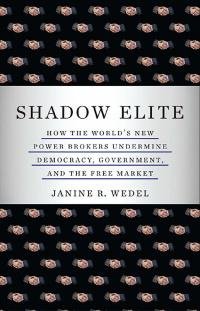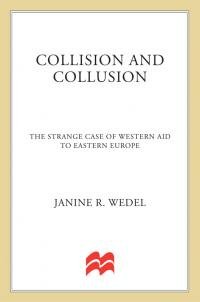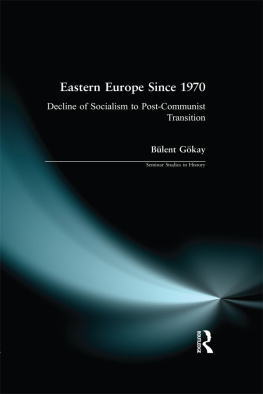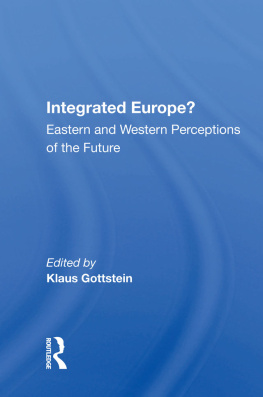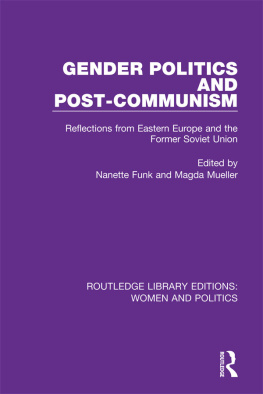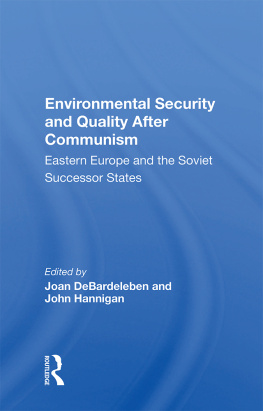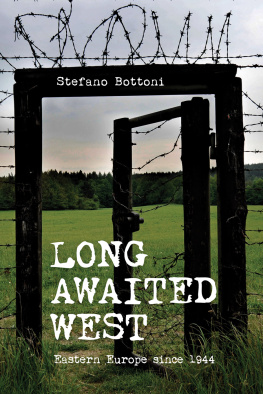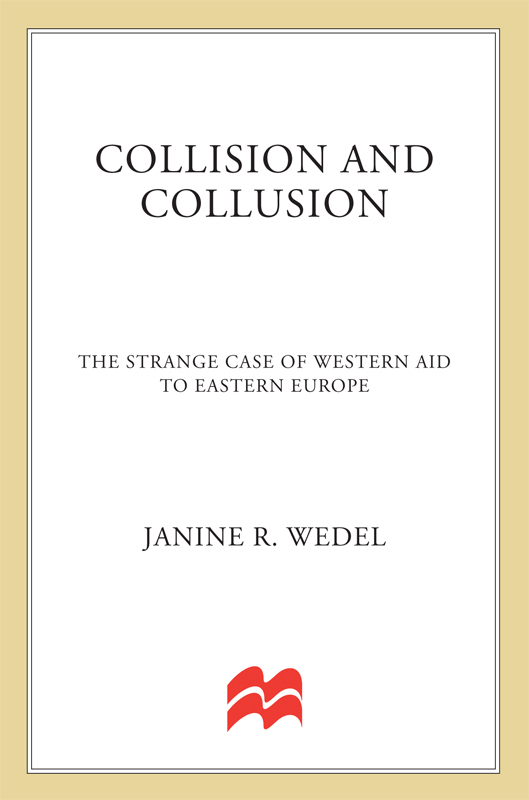Contents
Guide

The author and publisher have provided this e-book to you for your personal use only. You may not make this e-book publicly available in any way. Copyright infringement is against the law. If you believe the copy of this e-book you are reading infringes on the authors copyright, please notify the publisher at: us.macmillanusa.com/piracy.
Please note that some of the links referenced in this work are no longer active.
CONTENTS
To my parents
I have been following the aid story in Central and Eastern Europe since 1989. I am grateful to the Council for the International Exchange of Scholars for the two terms in Poland as a Fulbright scholar during 1989-90 and 1991-92 that piqued my interest in the topic. My subsequent, more systematic, study would not have been possible without research and writing support provided by the National Science Foundation, the John D. and Catherine T. MacArthur Foundation, the Woodrow Wilson International Center for Scholars, the Friedrich Ebert Stiftung, and the Kosciuszko Foundation. I am greatly indebted to these institutions.
The project has been intense and ambitious in its breadth, scope, information-gathering, and fieldwork. Crucial to the conduct of this nearly ten-year project was the help of so many people who granted interviews, located materials, and checked facts, not all of whom wished to be named here.
A number of people and institutions provided administrative and logistical help in my places of fieldwork: In Poland, Pani Antonina Dachw, Micha and Irena Federowiczowie, Aka Mikoszewska, and Jacek Poznaski and the Council of Ministers; in Bratislava, Ellie Sutter; in Russia, Debbie Seward, Svetlana Glinkina, Boris Greenberg, Masha Zolotukhin, and Vadim Ivanov and the Institute for the Economy in Transition; in Ukraine, Grigory Gubsky, Marta Kolomayets, and Ian Brzezinski; in Berlin, Yvonne Barber; in Bonn, Beth Pond; and in Belgium, Deanne Lehman and Benno Barnard.
Invaluable support in the United States was provided by Catherine Allen and the Department of Anthropology, Joseph Tropea and the Department of Sociology, and James Millar and the Institute for European, Russian, and Eurasian Studies, all of The George Washington University. I also very much appreciate the support of Carolyn Ban, dean of the Graduate School of Public and International Affairs at the University of Pittsburgh, my new academic home, and other colleagues at the school.
I am especially grateful to Vivian Keller for her skilled organizational help at crucial points of manuscript preparation. I also would like to acknowledge Lynne Taylor, Karen Coats, and Paul Smolarcik for editorial help, and my mother and father, Dolores and Arnold Wedel, for indexing the book. I wish to thank Chris Caltabiano, Katrina Greene, Anthony Gualtieri, Haley Hendrickson, Christina Herzler, Erind Pajo, Martina Pechova, and Doug Pyle for research assistance.
I was fortunate to have the help of talented readers. I am especially indebted to Jeff Dumas, Chris Hann, Bill Harwood, Antoni Kamiski, Phil Parnell, and Adam Pomorski. Igor Barsegian, Michael Bernstam, Steve Collier, Stephen F. Cohen, Gerald Creed, Steve Ebbin, Dan Guttman, Michael Illner, Kristine Kassekert, David Kideckel, Dave Lempert, Dave Mathiasen, Erind Pajo, Elena Petkova, Karla Scappini, Brian Wickland, Anne Williamson, and Lou Zanardi also provided valuable guidance on issues in the manuscript.
I am grateful to Chris Suddick for her creative cartoons and willingness to work with me on the project. And I wish to thank Karen Wolny, my editor, and Diana Finch, my agent, for their support.
Throughout the project, many people assisted in selfless and gracious ways. I am indebted to Igor Barsegian, Nancy Dunne, Renata Frenzen, Charles McMillion, Ron Potter, Karla Scappini, and, as always, especially to Jeff Dumas and Adam and Basia Pomorscy for their generous help and abiding interest.
Although many people helped with the project, any shortcomings in the final product are my responsibility alone.
ACAP | American Committee for Aid to Poland, Washington, D.C. |
AID | Agency for International Development (also known as USAID) |
CCET | Centre for Co-operation with Economies in Transition, OECD, Paris |
CIPE | Center for International Private Enterprise, Washington, D.C. |
CSO | Clearing and settlement organization |
EBRD | European Bank for Reconstruction and Development, London |
EC | European Commission, Brussels |
ECU | European Currency Unit |
EU | European Union |
EURO | European Monetary Unit |
FIP | Forum for Nongovernmental Initiatives, Poland |
FTUI | Free Trade Union Institute, AFL-CIO |
G-24 | Group of Twenty-Four (Canada, United States, Japan, Australia, New Zealand, Austria, Belgium, Denmark, Finland, France, Germany, Greece, Iceland, Ireland, Italy, Luxembourg, Netherlands, Norway, Portugal, Spain, Sweden, Switzerland, Turkey, United Kingdom) |
G-7 | Group of Seven (Canada, France, Japan, United Kingdom, Germany, Italy, United States) |
GAO | General Accounting Office (U.S. government body) |
GKI | Goskomimushchestvo or State Property Committee (Russian government body responsible for privatization) |
GKOs | Russian short-term treasury bills |
HIID | Harvard Institute for International Development, Harvard University |
HMC | Harvard Management Company, Harvard University |
IBRD | International Bank for Reconstruction and Development (also known as World Bank) |
IDA | International Development Agency, Poland |
ILBE | Institute for Law-Based Economy (USAID-funded organization in Russia) |
IMF | International Monetary Fund |
IQC | Indefinite Quantity Contract (contracting mechanism under USAID) |
ITCA | International Team for Company Assistance (American consulting firm) |
JRL | Johnsons Russia List (Internet mailing list, davidjohnson@erols.com ) |
KPN | Konfederacja Polski Niepodlegej, or Confederacy of Independent Poland (Polish political group) |
LPC | Local Privatization Centers (USAID-funded organizations in Russia) |
NACC | North Atlantic Cooperation Council |
NATO | North Atlantic Treaty Organization |
NDI | National Democratic Institute for International Affairs, United States |
NED | National Endowment for Democracy, United States |
NGO | Nongovernmental organization |
NIK | Najwysza Izba Kontroli (Supreme Control Board), Poland |


